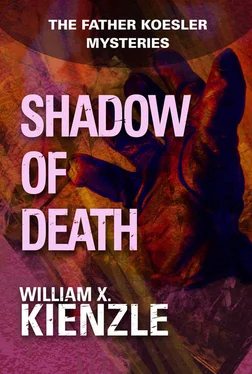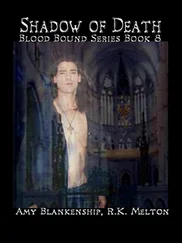“Nellie, you know me better than that!”
“I also know what can happen when you and Lennon cover the same story in the same town. In this case, it spells ‘Roman Holiday.’”
“Hey, that is neat, isn’t it? A terrific serendipity when the News decided to send Pat to Rome. Should save you guys some money, too. You don’t ‘spose the News and the Freep would want to split the cost of our room?”
“Now that’s exactly what I mean.” Kane rolled the unlit cigar from one side of his mouth to the other. “Just because the two of you live together in Detroit without benefit of clergy doesn’t mean that it’ll work in this case. Especially when you’re both covering the same story and especially when that story is in a foreign city.”
“What do you mean?”
“What I mean. Cox, is, that for all practical purposes, your hotel room will be your office. You won’t have any other office. You’re working this assignment for us. What if you have to make phone calls? What if you have to talk to me or one of the other editors? What if someone phones you? Lennon can hear everything. And if she gets a lead from any of those phone calls or messages, she goddamn well is going to take advantage of it.
“And the same holds true for you. The News won’t want such an arrangement any more than we do. This is not a vacation. It’s not even a working vacation. You and Lennon may be ‘significant others’ for each other here. But in Rome you don’t know Lennon. Except as a competing reporter. And a goddamn competent one at that.”
Lennon had received much of her journalistic training at the Free Press. Kane still winced at the memory of her departure to the rival News . . . although he had to admit she’d had good reason at the time.
“O.K., O.K. But as long as we’re both on this story, there is one thing I want to know.”
“Yeah?”
“When does it end?”
“What?”
“After the ceremonies in Rome are completed,” Cox consulted his notepad, “on May 4th, the Detroit contingent—or at least most of it—will move on to England and Ireland before returning to Detroit. So when does the assignment end? Rome? England? Ireland?”
“England and Ireland are courtesy visits . . . part of the entourage’s package tour. The news angle is Boyle’s becoming a Cardinal . . . which takes place in Rome. That answer your question?”
“Ordinarily, yes. And I could have figured that out. Except that I have a feeling . . . a sort of presentiment.”
“Like what?”
“I don’t quite know. Like all premonitions, it’s hard to spell out—”
“Try.”
“Well, a couple of things have happened and I don’t know if they add up to a scenario.”
“Go ahead.”
“First, Boyle is named a Cardinal. Then the Cardinal in Toronto is killed—literally wasted. Cardinal Claret was an important figure in the Church. So is Boyle. What if—and I know this is going to sound farfetched—what if there proves to be a connection?
“What if precisely that important Canadian Cardinal was killed deliberately—for a specific reason? What if whoever killed Claret intends to attack another important Cardinal—of the United States? I just mean . . . what if . . .”
Normally, Kane would have dismissed this as a remote possibility. The Toronto police had pretty well concluded that the Claret killing was a fluke. Some hophead had simply struck at random and happened to hit a very important person.
But . . . if there was one thing he and Cox shared it was a keen news sense. A feeling not only for news that had happened, but a sense of the direction in which news was going to develop.
And the Free Press was still smarting from that fiasco wherein their erstwhile executive manager had arbitrarily pulled their leading sports columnist, despite his protests, home from the Olympics, saying that he’d been in Munich long enough . . . and that furious columnist, under threat of dismissal had boarded the jet home, only to discover when he deplaned in Detroit that terrorists had captured the Israeli athletes, and the eyes of the world were now on Munich.
“Play it as it lies, Joe. I’ll just rummage around in the exchequer in case—in the unlikely case—your hunch is right,” sardonically, “for a change.”
2.
The atmosphere was tense. The result of an exchange of many angry words. The twenty people—three of them women—gathered in the small office were black. The stenciled sign on the outside of the closed door read: Office Of Black Catholic Services, Archdiocese Of Detroit.
“What it comes down to,” Perry Brown was almost shouting, “is that he’s abandoned us! That’s the bottom line!”
“You’re being simplistic,” Ty Powers charged.
The argument, initially joined by nearly everyone in the room, now had narrowed to these two. They were the only ones still standing. Powers, tall, well-built, light-complexioned, was director of Black Catholic Services, appointed by Archbishop Boyle.
Brown, of medium height, pencil-thin, Afro-topped, was a physician whose patients included many in the black community who could afford neither medical treatment nor hospitalization insurance.
“How many Catholic schools in the core city has Archbishop Boyle closed?”
“Perry—”
“How many of our parishes has he closed?”
“Perry, it’s not so much that the Archbishop is closing schools and parishes.”
“No? Then what is it?”
“He’s pronouncing them dead. They died. We didn’t build them; white Catholics did. Then they moved away. There weren’t enough black Catholics left to support them. So they died. There wasn’t anything the Archbishop could do about it.”
“He could keep them open and operating!”
“Be reasonable: How is he going to do that?”
“By making a commitment to the core city!” Brown looked around. Most of those present seemed to be in agreement with him.
“The Archbishop has that kind of commitment. The Inter Parish Sharing Program was his baby. It was his idea to have suburban parishes share with the inner-city parishes.”
“Well,” Brown placed his hand on the chair in front of him and leaned forward, “I’ve got news for you and for him; His baby died abornin’.”
“That’s what I’ve been trying to tell you: Archbishop Boyle wants to keep our parishes and schools open. And he’s even tried to keep them open with programs like the IPSP, but his hands are tied. The whites who built these churches and schools have moved away. And,” Powers emphasized, “they have made it very clear they are not going to continue to support them.”
“Precisely why the Archbishop should not have made the sharing voluntary.”
“Not voluntary!?”
“Not voluntary!” Brown converted Powers’ shocked tone into one of triumph. “It does not require an MBA to know that all temporalities in this archdiocese are held in the name of the Catholic Archbishop of Detroit, whoever he may be.”
“You mean . . .” Powers seemed unable to complete the thought.
“Take it! Take the money from the savings of the rich parishes and distribute it to the poor. If the ‘have’ parishes will not be Christian to the ‘have-not’ parishes, then impose Christianity on them.”
There was a stunned silence.
“Why not?” someone finally asked, rhetorically.
“It makes sense,” someone else commented.
“It makes damn good sense,” another added.
Silence. They were awaiting Powers’ response.
“Ridiculous. It’s ridiculous. One move like that and he wouldn’t have a diocese anymore. You may recall, in 1968, the year after the riots, when the Archbishop allocated a healthy chunk of the Archdiocesan Development Fund collection to the needs of the inner city. There was plenty of very audible griping from white Catholics about how all their money was going to be used by ‘those niggers.’ And the following year, the ADF collection plummeted.
Читать дальше












